|
|
|
Sort Order |
|
|
|
Items / Page
|
|
|
|
|
|
|
| Srl | Item |
| 1 |
ID:
124173
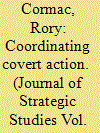

|
|
|
|
|
| Publication |
2013.
|
| Summary/Abstract |
Focusing on British involvement in the 1960s Yemen Civil War, this article examines the centralised mechanisms developed in Whitehall to coordinate covert action interdepartmentally. It therefore sheds new light on London's security and intelligence machine and its input into clandestine operations. Drawing on recently declassified documents and interviews, it uncovers various important but secretive actors, which have been overlooked or misunderstood in the existing literature, and outlines their functions in the most detail yet available. In doing so, it considers how these bodies evolved in relation to competing threat assessments of the local situation and the impact they had on Britain's covert intervention in the theatre. This article assesses the utility of the system and argues that it provided an effective means to ensure that any covert action sanctioned was properly scrutinised so as to reduce risks and best meet national interests.
|
|
|
|
|
|
|
|
|
|
|
|
|
|
|
|
| 2 |
ID:
188251
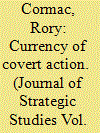

|
|
|
|
|
| Summary/Abstract |
At the start of the 1960s, the UK embarked on a programme of covert action in Latin America. This appears puzzling: the UK was overstretched; Latin America fell outside its area of strategic interest; and UK covert action was dwarfed by that of the US. After revealing this activity for the first time, this article argues that the UK turned to covert action for reasons beyond orthodox explanations of reducing threats in a plausibly deniable manner. Instead, policymakers recognised the currency of covert action in the Anglo-American relationship and in generating trade with emerging economies in Latin America.
|
|
|
|
|
|
|
|
|
|
|
|
|
|
|
|
| 3 |
ID:
153644
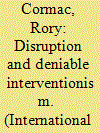

|
|
|
|
|
| Summary/Abstract |
The United Kingdom has long engaged in covert action. It continues to do so today. Owing to the secrecy involved, however, such activity has consistently been excluded from debates about Britain’s global role, foreign and security policy and military planning: an important lacuna given the controversy, risk, appeal and frequency of covert action. Examining when, how and why covert action is used, this article argues that contemporary covert action has emerged from, and is shaped by, a specific context. First, a gap exists between Britain’s perceived global responsibilities and its actual capabilities; policy elites see covert action as able to resolve, or at least conceal, this. Second, intelligence agencies can shape events proactively, especially at the tactical level, while flexible preventative operations are deemed well suited to the range of fluid threats currently faced. Third, existing Whitehall machinery makes covert action viable. However, current covert action is smaller scale and less provocative today than in the early Cold War; it revolves around ‘disruption’ operations. Despite being absent from the accompanying debates, this role was recognised in the 2015 Strategic Defence and Security Review, which placed intelligence actors at the heart of British thinking.
|
|
|
|
|
|
|
|
|
|
|
|
|
|
|
|
| 4 |
ID:
146317
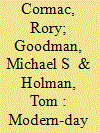

|
|
|
|
|
| Summary/Abstract |
Covert action can be an important weapon in a state’s arsenal. It is, however, inherently controversial and risky. Rory Cormac, Michael S Goodman and Tom Holman argue that when considering covert action, Whitehall should look to lessons from the recent past. The UK has long used covert action, and how best to manage and co-ordinate such sensitive activity was for many decades a key preoccupation of its policy-makers and politicians. Given the secrecy involved, these lessons, and the machinery created, have been lost to history. Yet with covert action seemingly now back on the agenda, previous experience and hard-learnt lessons have assumed renewed importance.
|
|
|
|
|
|
|
|
|
|
|
|
|
|
|
|
| 5 |
ID:
121905
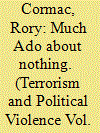

|
|
|
|
|
| Publication |
2013.
|
| Summary/Abstract |
Through its ability to transcend not only national boundaries but so too departmental jurisdictions and the traditional public-private security divide, the rise of international terrorism in the late 1960s and early 1970s posed a number of challenges to the British intelligence machinery which remain relevant today. This article focuses on the dangers and mechanics of threat exaggeration and the importance of intelligence coordination to ensure that threats are assessed and reports are disseminated in a realistic manner. Using the over-emphasised threat of maritime terrorism in 1970 as a case study, this article is able to examine the intelligence cycle as a whole and consider the importance of source validation, the dangers of incremental analysis, and the need for coordinated advice disseminated coherently to consumers both inside and outside of the government.
|
|
|
|
|
|
|
|
|
|
|
|
|
|
|
|
| 6 |
ID:
100934


|
|
|
|
|
| Publication |
2010.
|
| Summary/Abstract |
This article introduces, places in historical context and publishes selected extracts from chapter one of the Report on Colonial Security, which deals specifically with intelligence organisation both in London and overseas. Written by General Sir Gerald Templer in 1955, the report (particularly the intelligence aspects) is significant for the following reasons: it highlights the centralized and colonial intelligence failures in a particularly frank and candid manner; it details channels of communication and liaison between London and the colonies which remain classified elsewhere; and it had a substantial impact on the subsequent reorganisation and reform of intelligence in Whitehall and across the British Empire.
|
|
|
|
|
|
|
|
|
|
|
|
|
|
|
|
| 7 |
ID:
127722


|
|
|
|
|
| Publication |
2014.
|
| Summary/Abstract |
International economic issues have become a foremost government concern since the start of the global financial crisis, leaving economic security increasingly linked to more traditional concepts of national interest and politico-military security. This prioritization has been reflected in the recent requirements of the United Kingdom's intelligence and security actors. Yet, scholarly research has neglected the relationship between intelligence, international economics, and contemporary security policy. Taking current requirements as a catalyst, this article draws on contemporary British history to explore when intelligence can be used to protect economic security and when intelligence actors can best use economic measures to achieve broader politico-military goals. The use of secret intelligence in the economic sphere does, however, have certain limitations and it should therefore only be employed when necessary
|
|
|
|
|
|
|
|
|
|
|
|
|
|
|
|
| 8 |
ID:
168622
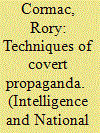

|
|
|
|
|
| Summary/Abstract |
In early 2019, the British government declassified a tranche of Information Research Department files. Among them is a candid and concise overview of British thinking about covert propaganda, complete with a list of examples of British forgery operations. This short piece transcribes the briefing note and provides an introduction. The document sheds new light on UK covert action, but also talks to ongoing scholarly debates in Intelligence Studies and International Relations more broadly.
|
|
|
|
|
|
|
|
|
|
|
|
|
|
|
|
| 9 |
ID:
183704
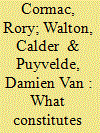

|
|
|
|
|
| Summary/Abstract |
Covert action has long been a controversial tool of international relations. However, there is remarkably little public understanding about whether it works and, more fundamentally, about what constitutes success in this shadowy arena of state activity. This article distills competing criteria of success and examines how covert actions become perceived as successes. We develop a conceptual model of covert action success as a social construct and illustrate it through the case of ‘the golden age of CIA operations’. The socially constructed nature of success has important implications not just for evaluating covert actions but also for using, and defending against, them.
|
|
|
|
|
|
|
|
|
|
|
|
|
|
|
|
|
|
|
|
|